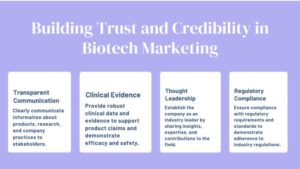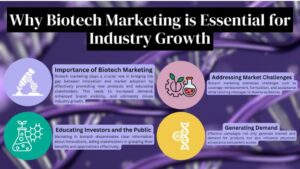The path to bringing biotech products to market is fraught with obstacles. It is a multifaceted process involving challenges such as obtaining coverage and reimbursement, developing effective dosage forms, gaining physician uptake, and ensuring patient convenience. These impediments can significantly slow down or even completely prevent the product from reaching its intended audience.

To overcome these challenges, appropriate marketing efforts are necessary. Such campaigns become central to how businesses position themselves on various issues. They educate investors and the public on the benefits and potential of new biotech products, which in turn attracts both investment and demand.
An efficient marketing strategy undeniably demands a huge amount of personalization. The firm should tailor its communication to different target audiences, each with their own unique yet sometimes overlapping interests and needs. They can reach the public through customized communication that addresses stakeholders’ pain points, attracting attention to the business.
This also signifies that other real-world information should also be made known. The data collected from this proof gives a clear picture of how effective and safe biotech products can be in actual fields. These facts increase doctors’ recognition and patients’ trust. By presenting real-world evidence of their product’s use, companies can provide stronger proof of its value. This results in higher compliance with market needs and increased sales.
Harnessing Innovation through Visibility
Biotech marketing solutions is an umbrella term that covers the area from pharmaceutics and health services to agricultural and environmental studies. Amid this variety, though a large number of research and development efforts are possible, they can easily sink into oblivion if there is no massive-scale marketing. By appropriately demonstrating their pioneering achievements, companies can generate interest from potential investors or partners, thereby driving additional funding and support for further innovation.
Building Trust and Credibility
Since breakthroughs in this field can either improve public health or impact the environment, building confidence is fundamental. By using biotech marketing, you can effectively convey information about the reliability, safety, efficacy, and ethical standards of the research and product development.
Through educational content, conferences, and community outreach, companies can build a reputation for dependability and credibility. As these two attributes are crucial for the long-term prosperity of a business, they can become solid pillars in its development and triumph.

Navigating Regulatory Landscapes
Navigating the complex maze of regulatory approvals in the biotechnology space is challenging. Accounting teams should coordinate with regulatory affairs staff to comply with regulations and effectively communicate product or service selling propositions. Accurate and clear messaging can aid in the approval process and mitigate potential challenges. This may help ease the time-to-market process as well as the commercial usefulness of the product.
Facilitating Partnerships and Collaborations
Collaboration is essential in biotech, necessitating interdisciplinary teams to address complex issues. Marketing helps by identifying the competencies, goals, and benefits that all parties will gain from the partnership. Integrated efforts in technology transfer and joint research can stimulate progress and elevate results.

Educating and Empowering Stakeholders
The speedy innovation with which biotech is going sometimes causes the public to lag in their understanding. Effective marketing educates stakeholders about their responsibilities, helping them make informed decisions about health, agriculture, and the environment. Using plain language can break down conceptual barriers to these technologies, while addressing misinformation can promote their acceptance and adoption.
Securing Investment and Funding
Financing for biotechnology research and commercialization spans from discovery to commercialization. B2B marketing agencies, especially those connected with venture capital, private equity, and government aid, are critical for the industry to continue innovating. By articulating market opportunities, competitive advantages, and potential returns, companies can secure financial resources, ensuring growth and timely completion of tasks.
Adapting to Market Dynamics
One major trend in biotechnology is the continuous evolution driven by achievements, regulatory changes, and emerging market trends. Rapidly changing marketing strategies allow companies to quickly seize opportunities and mitigate risks. By tracking responses, competitor behaviors, and leveraging data, marketing teams can continuously adjust messaging and positioning to stay current in a constantly changing world.
Enhancing Market Access and Commercialization
Bringing biotechnology products to market involves overcoming obstacles such as coverage reimbursement, formulation, physician acceptance, and patient access. Successful marketing campaigns are the standard strategy for businesses to overcome barriers, educate investors and the public, and ensure product demand. Through customized messaging, addressing unique audience pain points, and presenting real-world evidence, companies can facilitate market compliance and increase sales.
Fostering Thought Leadership and Innovation Culture
Collaboration fosters innovation in workspaces where socialization and brainstorming are paired with knowledge exchange. Effective marketing approaches can position companies as thought leaders in the market, establishing dialogue and a culture of innovation. By curating content, organizing events, and engaging with influencers, organizations can nurture dialogue, generate ideas, and attract top talent, contributing to a culture of advancement and discovery.
Conclusion
In conclusion, biotech marketing is far more than a side function; it is the driver of expansion and sustainability. By utilizing knowledge, credibility, mutual understanding, education, and innovation, the marketing department becomes a driving force in bringing scientific breakthroughs to life for the welfare of society.
No sector can embrace rapidly transforming technology better than biotech, particularly in healthcare, agriculture, and environmental conservation. Therefore, the need for an effective marketing strategy will remain critical and will continue to shape the growth of this industry for years to come.
FAQs
1. What is biotech marketing?
Biotech marketing involves the strategic promotion of biotechnology products and services to various stakeholders, including investors, healthcare professionals, patients, and the general public.
2. Why is biotech marketing important for industry growth?
Biotech marketing is crucial for industry growth because it helps bridge the gap between scientific innovation and market adoption. It ensures that new and existing biotech products are understood, accepted, and used by the target audience.
3. How does biotech marketing help in educating stakeholders?
Biotech marketing educates stakeholders by providing clear, accurate, and compelling information about the benefits and uses of biotech products. This involves creating educational content, conducting outreach programs, and utilizing various media channels to disseminate information.





